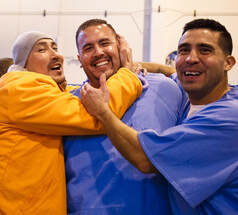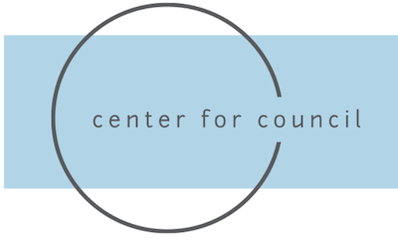 My name is Efrain Ortiz. I am the Program Assistant with Center for Council, but most importantly I am an example of what transpires when one engages in the practice of council. I believe in life you don’t merely stumble across opportunities by chance. I was first introduced to council while serving a 12-year sentence inside of California State Prison-Los Angeles County, in Lancaster, California, where I worked as a clerical assistant in the main office. I was in charge of typing up incidents and rules violation reports. I already had my share of violent experiences, but working inside the main office I got to witness how violent and disruptive prison really is, as I had a firsthand view of every violent incident which took place in our facility. Our yard was one of the most violent, high-security facilities in the state of California at the time. We lacked resources and support with only two self-help groups (Alcoholics Anonymous and Narcotics Anonymous) which rotated every Saturday, until Center for Council came along. It was here, in the circle created by Center for Council, where we as individuals had the opportunity to sit amongst other men and both speak and be heard with regard. We learned the four intentions of council: speak from the heart, to speak from that sacred place where often I wouldn’t share with just anyone; listen from the heart, something I continue to work on as it is often times the forgotten half of true communication, holding my judgement or my need to resolve; be spontaneous, allowing yourself to say what arises at the given moment that the talking peace is in your hand; be lean, so others have a chance to share their stories, and I found that often I learned more about myself through the stories of others. To be able to get to this point was no easy task. I was sitting in a high security, level four prison with men who have committed some horrible crimes. But in the council circle, I was no longer sitting with those boys from back then. Through practice, we began to trust each other as the stories got deeper, the layers we began to peel off revealed the hurt we suppressed for many years. We began to connect to one another through our shared stories, as we connected the dots to our past, understanding those traumatic experiences and how they led us to a tumultuous life. The amazing thing was, we started to look at one another as human instead of by race, gang affiliation or moniker. We all had monikers which we received or gave ourselves from our gangs or past lives. This was something that I took pride in. I wanted to live up to that moniker by instilling fear in others, never realizing this was a facade I was creating, seeking acceptance and validation. It was a mask that I and many of us wore to protect ourselves from underlying truths. We made a commitment in council, as a group, to no longer use our monikers, but to call each other by our real names. We wanted to create a more humanizing environment, which although weird at first, we began to embrace. As we no longer called ourselves by our monikers on the yard—which seemed odd to some—others began to take notice of the changes and wanted what we had in council. In a place where racial divides are strong, instilled in us by others with the potential to cause harm if not obeyed, we began to break down these barriers and engage with one another outside of our circle and on the yard. We formed a brotherhood, a support system which was unbreakable. The officers began to take notice of the change in many of the members of our group and were curious about how it was possible. We began to see a dramatic decrease in violence on the yard, as more and more self-help groups came onto the facility.
One of the amazing shifts I saw was when I was walking with a friend of mine from council and someone called him by his moniker, he stopped and turned to the individual correcting him saying to call him by his first name. He no longer was that person and stated I am _____. We all began to accept and be the real person underneath all those layers of masks. It was like through the stories, the healing, the relationships we built, we were able to tap into that inner child, the innocent child before the corruption, the conditioning, the false beliefs, the negative thoughts. We loved getting together on Tuesdays with the brothers and embraced each other as we walked into class, but once we fell into council we all knew we were in that sacred place - or, like my brother Sam would say, “the brave space.” It was a place where one could be vulnerable and share their deepest thoughts and rawest emotions without fear of being judged. Center for Council was not only pivotal in my growth as a person, but in the change of environment on Facility B in Lancaster State Prison, and many others. There is a need for council on all facilities in California and nationwide. Now, in my role as Program Assistant with Center for Council I am focused on bringing this program to as many facilities as we can reach. Center for Council’s Prison Council Initiative has been offered in 27 of California’s 33 prisons, and our goal is to not only reach all 33 but to expand to other states to teach the practice of council. I envision a time when Correctional Officers, Wardens, and incarcerated men and women can sit in a circle to create understanding through our shared stories. Upon my release over a year ago it was with council in which I found belonging. Sitting in circles with others of different walks of lives all-embracing me—a “violent offender” or “felon.” We want to create this environment for others returning home to support them as they assimilate back into society and reduce recidivism. I know, firsthand, it is not an easy task after being away for a decade. With council, they will know they are always welcomed and have the support they need to not only overcome but to thrive in this society.
0 Comments
Leave a Reply. |
Categories
All
Archives
March 2024
|
|
|
About |
|




 RSS Feed
RSS Feed
